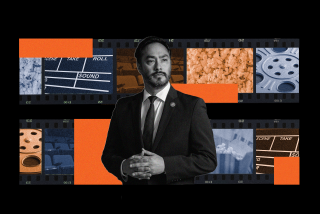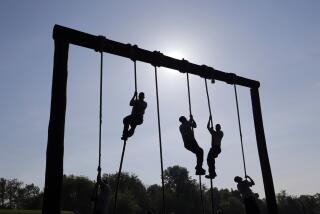Navy Will Set Up Donor Registry for Radiation Mishaps
- Share via
The U.S. Navy has decided to finance the creation of a nationwide registry of 100,000 civilians who could be called upon to donate bone marrow to injured sailors in the event of a serious accident aboard a nuclear submarine, Navy and civilian medical sources confirmed Thursday.
For more than 18 months, the proposal has been the subject of a vigorous debate within the top echelons of the Navy. But until only recently, opponents of such a network have prevailed, partly on the argument that the plan might attract unwarranted criticism from nuclear power detractors.
In recent months, however, advocates of the plan have been exerting increasing pressure in Congress and on the Navy brass itself to implement it.
And in January, the Navy began seeking bids to form the registry--long before the Chernobyl accident last month heightened awareness about the role of bone marrow transplants in treating severely irradiated people. Still, the Soviet nuclear reactor accident is expected to help overcome doubts that such a system can play an important role in treating radiation victims.
The registry also is intended as a source of marrow for civilians who suffer from aplastic anemia and certain cases of leukemia for whom marrow transplants are vital.
The Naval Medical Command is expected to award a contract next month to an outside agency to establish such a registry that, for the first time, would provide the Navy and civilian transplant centers with the names, tissue type and other pertinent information on every prospective marrow donor in the nation.
A Navy spokeswoman declined to discuss the leading contenders among bidders for the contract, but civilian medical sources predict that the winning contract will go to a consortium composed of the American Red Cross, the American Assn. of Blood Banks and the Community Council of Blood Centers.
Vital information on many potential donors already exists in the files of blood centers in key U.S. cities. But it is not available collectively on a national basis, Dr. John Hansen, of the Fred Hutchinson Cancer Center in Seattle, said.
“We are hoping that individual centers will participate and thereby substantially increase the number of national donors,” Hansen said. “We will then have a single network instead of 20 separate ones.”
A key feature of the registry is that it will consist of volunteers who are willing to donate marrow to recipients who are unrelated to them. Nearly all of the marrow transplants that have been performed in the United States have used marrow from either siblings or other close relatives of the recipient. Without such compatibility, transplants often do not succeed.
Medical experts say the availability of a large pool of donors who collectively possess a wide range of tissue types could help save lives now being lost to leukemia or aplastic anemia because the patients lack a sibling with a matching tissue type.
Only about 30% of patients with a sibling have one with a tissue type compatible with their own. It is estimated that there are about 10,000 human tissue types and that a pool of 100,000 people could accommodate about 85% of all prospective recipients, bone marrow experts say.
Such a registry could benefit some 5,000 patients annually, said Dr. Robert P. Gale, the UCLA bone marrow expert who treated victims of Chernobyl .
The national pool of 100,000 people would consist mostly of individuals who now regularly donate platelets--the blood component that is involved with clotting--to hemophiliacs and others with bleeding problems. Because platelet donation requires tissue typing, these donors have already been typed.
Under the Navy proposal, local donation centers would have to ask the platelet donors whether they would be willing also to donate marrow, which carries a small risk of serious complications and requires the donor to be anesthetized.
A year ago, a panel of bone marrow experts meeting at the National Institutes of Health in Bethesda, Md., turned down a civilian proposal, inspired by an act of Congress, to form a nationwide network of prospective donors for civilian use.
One reason the panel did not recommend it was the relatively low survival rate--about 20%--among the small number of unrelated donor marrow transplants that have been done to date, said Dr. Bruce Cheson of the National Cancer Institute. This contrasts with a success rate of up to 80% for aplastic anemia and 50% for leukemia cases who have received matched marrow from a sibling.
Another reason, he said, was that the local blood centers were worried that such a national registry might destroy “the high level of enthusiasm” and local pride that now exists among their donors. Whether local center officials will support a national registry remains to be seen.
“The possibility of a nuclear accident has been on our minds for a long time, but people have been reluctant to talk about a registry because it sounds ghoulish,” said Bart Fisher, founder of the Aplastic Anemia Foundation of America.
The notion of using the Navy to launch a national bone marrow registry was advanced 18 months ago by Sen. Paul Laxalt (R-Nev.).
More to Read
Sign up for Essential California
The most important California stories and recommendations in your inbox every morning.
You may occasionally receive promotional content from the Los Angeles Times.













